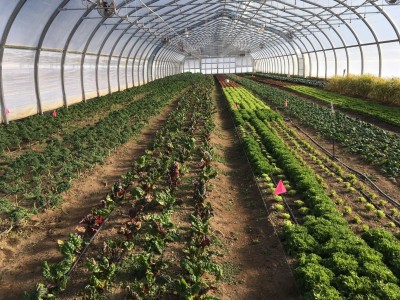Supplemental Heat for Winter Greens Production: What's the Cost?
Ethan Grundberg, Vegetable Specialist
Eastern New York Commercial Horticulture
 Winter greens in high tunnels at then Poughkeepsie Farm Project
Winter greens in high tunnels at then Poughkeepsie Farm ProjectThere seems to be little agreement among winter greens growers regarding the true costs and potential value of using supplemental heat all winter. With support from the Northeast Sustainable Agriculture Research and Education program (NE SARE) and the generous cooperation of the Poughkeepsie Farm Project (PFP), we tried to start gathering some data to add to the high tunnel heating debate. We tracked yield, soil nitrate availability, total nitrogen uptake, propane use, and soil temperature all winter in the two identical side-by-side 42'x196' double layer inflated poly Harnois high tunnels with one tunnel set to 33 degrees ambient air temperature and the other set to 40.
The data from the trial is still being analyzed, but here are a few key results that have emerged:
- Maintaining adequate soil moisture and, ideally, living roots in the high tunnel before planting is necessary to preserve the soil microbial community that makes nitrogen available for plant uptake.
- Soil nitrate levels were not significantly or consistently different between the two temperatures; however, total nitrogen uptake in the warmer tunnel was higher for curly kale, spinach, and especially for Salanova lettuce.
- The warmer tunnel yielded three harvests in the same time that the cooler tunnel yielded only two.
- It took 979 gallons of propane to heat the tunnel to 33 degrees from November through March. It took 2.1 times as much propane to add the extra 7 degrees to reach 40 over the same period.
- Fertilizing to 70 pounds/acre of nitrogen in September provided sufficient nitrogen to kale, spinach, and Salanova until mid-February.
- Targeted early spring fertigations with soluble Chilean nitrate carried those crops to maturity in early April
A big thanks to the great crew at PFP for all of the help tracking yield! Going forward, a group of vegetable specialists with Cornell Cooperative Extension hopes to continue to investigate fertility management in winter high tunnels generally and specifically the interplay between supplemental heating and nitrogen. If you are interested in collaborating, please reach out to Ethan at eg572@cornell.edu.
This article is from the April 26, 2018 edition of ENYCHP Vegetable News. To read the full newsletter, CLICK HERE.

Upcoming Events
Vegetable Field Meetings with Dr. Steve Reiners
July 14, 2025 : Herkimer County - Ivan Martin's Farm
Herkimer, NY
Topics: Tomato Fertility and Mitigating Physiological Disorders; Pest Scouting, ID, and IPM Field Walk.
July 15, 2025 : Washington County - Hand Melon Farm
Greenwich, NY
Topics: Tomato Fertility and Mitigating Physiological Disorders, Tomato and Sweet Corn IPM; FSMA Water Assessments and Postharvest Sanitation
July 16, 2025 : Ulster County - Wallkill View Farm
New Paultz, NY
Topics: Tomato Fertility and Mitigating Physiological Disorders; Veg Pest Update and Management; Cornell Tomato Breeding Program and Slicer Tomato Variety Trial Tour
2025 Berry Twilight Meetings
July 2, 2025 : Berry Twilight Meeting at Dressel Farms
New Paltz, NY
Join Heather Kase, CCE ENYCHP, and Anna Wallis, Cornell IPM, for seasonal updates on berry pest man-agement and IPM.
July 16, 2025 : Berry Twilight Meeting at Samascott Orchards
Kinderhook, NY
Join Heather Kase, CCE ENYCHP, and Anna Wallis, Cornell IPM, for seasonal updates on berry pest man-agement and IPM.
August 6, 2025 : Berry Twilight Meeting at Fishkill Farms
Hopewell Junction, NY
Join Heather Kase, CCE ENYCHP, and Anna Wallis, Cornell IPM, for seasonal updates on berry pest man-agement and IPM.
Champlain Valley Orchard Field Afternoon
July 17, 2025 : Champlain Valley Orchard Field Afternoon
Chazy, NY
This July ENYCHP will be hosting an orchard field afternoon highlighting Mike's research trials at Chazy Orchards.












































